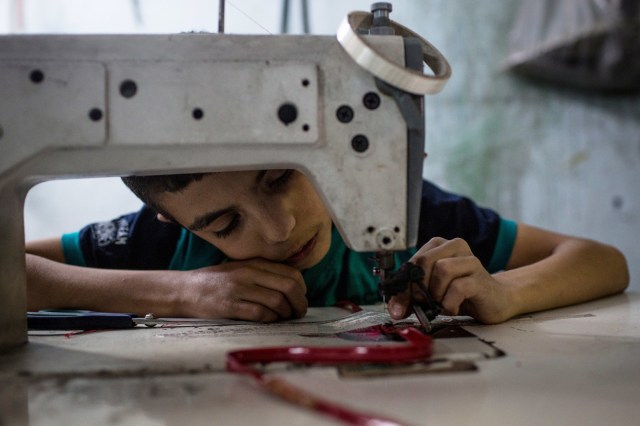A Syrian child working in a Turkish garment factory. Credit: Chris McGrath / Getty

The “corporate social responsibility roadshow” was in London the other week, and I climbed aboard. Big name sponsors were 10-a-penny at the Thomson Reuters Foundation’s Trust Conference. Combatting slavery is big business these days.
I attended on a heavily discounted pass, representing a great abolitionist charity, and it is just as well. Cinderella couldn’t afford this ball. NGO ‘discounted’ tickets started at £599, with £1,495 the premium rate (not including VAT of course).
It’s a cause everyone can get behind. But the only trouble is, there’s no way on earth the people actually doing frontline anti-slavery work could afford to be here. For the price of the cheapest ticket, a Latvian charity could run their prevention work for a month. And that’s not including the travel and accommodation.
I have been in and around the anti-trafficking world since the late Nineties, and have watched big business pile-in. I’m not against this per se. And I’m glad the issue is finally getting the attention it warrants: business needs to up its game to eradicate slavery from their supply chains. But there’s a world of difference between authentic efforts to clean up business practices and window-dressing.
It’s hard to tell how much corporate sponsorship has actually helped. As things stand, there is nothing to prevent businesses from requiring all of their suppliers to meet human rights standards. And there’s nothing to prevent those businesses from policing their supply chains to ensure they’re not full of slaves. But how many have actually chosen this route? As big fashion brands chase lower labour costs, it seems the problem is getting worse.
The corporate take-over has failed to make a positive difference to the lives of trafficked women, partly because cash tends to be injected into the already established, well-funded NGOs with bigger profiles than those who are actually making a real difference. A story broke only last week about the anti-slavery NGO, Prajwala, which has been lauded by praised by celebrities and governments alike, yet now stands accused of exploiting the women it shelters.
It’s a narrative that cuts across the whole aid industry. It is at the heart of the two-year Civil Societies Future inquiry which was published last week, which concluded that charities have become disconnected from the people they are meant to serve. They are focusing, instead, on chasing cash, growing bigger and protecting brands. In my experience, too, the anti-trafficking organisations that do make a difference are those smaller grassroots ones, run by those who can best support the victims – such as women of colour who understand the misogyny and racism that underpins the slavery business.
It has become fashionable for big corporations and trusts to throw money at this issue, mainly thanks to the efforts of those small human rights organisations which have worked so hard to expose how many enslaved, trafficked labourers have been working within corporate supply chains. But as I listened to these businesses “sharing best practice” in combatting trafficking, I heard nothing remotely innovative or new. It felt like it was just a way of enabling those businesses to put something in their Corporate Social Responsibility reports.
What really left a bad taste in my mouth, though, was when a young woman was wheeled out to talk about ‘sex work’. She wept as she begged the room – filled with rich Westerners – for money, on behalf of the NGO Kranti.
I know very well that these stunts are part and parcel of the fundraising ‘business’ these days. Comic Relief does it to great effect and it convinces thousands of Westerners to put their hands in their pockets. But small, grassroots NGOs tend to balk at displaying survivors in this way, considering it patronising and undermining.
There were several delegates there who agreed with me. But they were loathe to be identified lest their personal quest for funding be scuppered. Like an abusive relationship, the money seduces and enamours, only then to become the monster you can’t live with, can’t live without.










Join the discussion
Join like minded readers that support our journalism by becoming a paid subscriber
To join the discussion in the comments, become a paid subscriber.
Join like minded readers that support our journalism, read unlimited articles and enjoy other subscriber-only benefits.
Subscribe